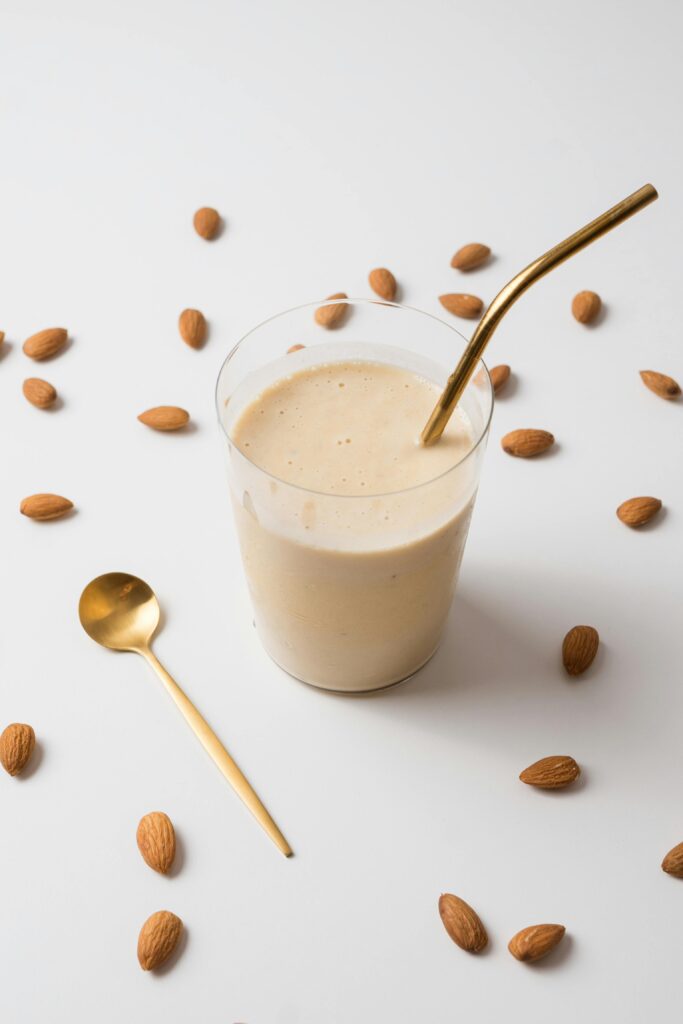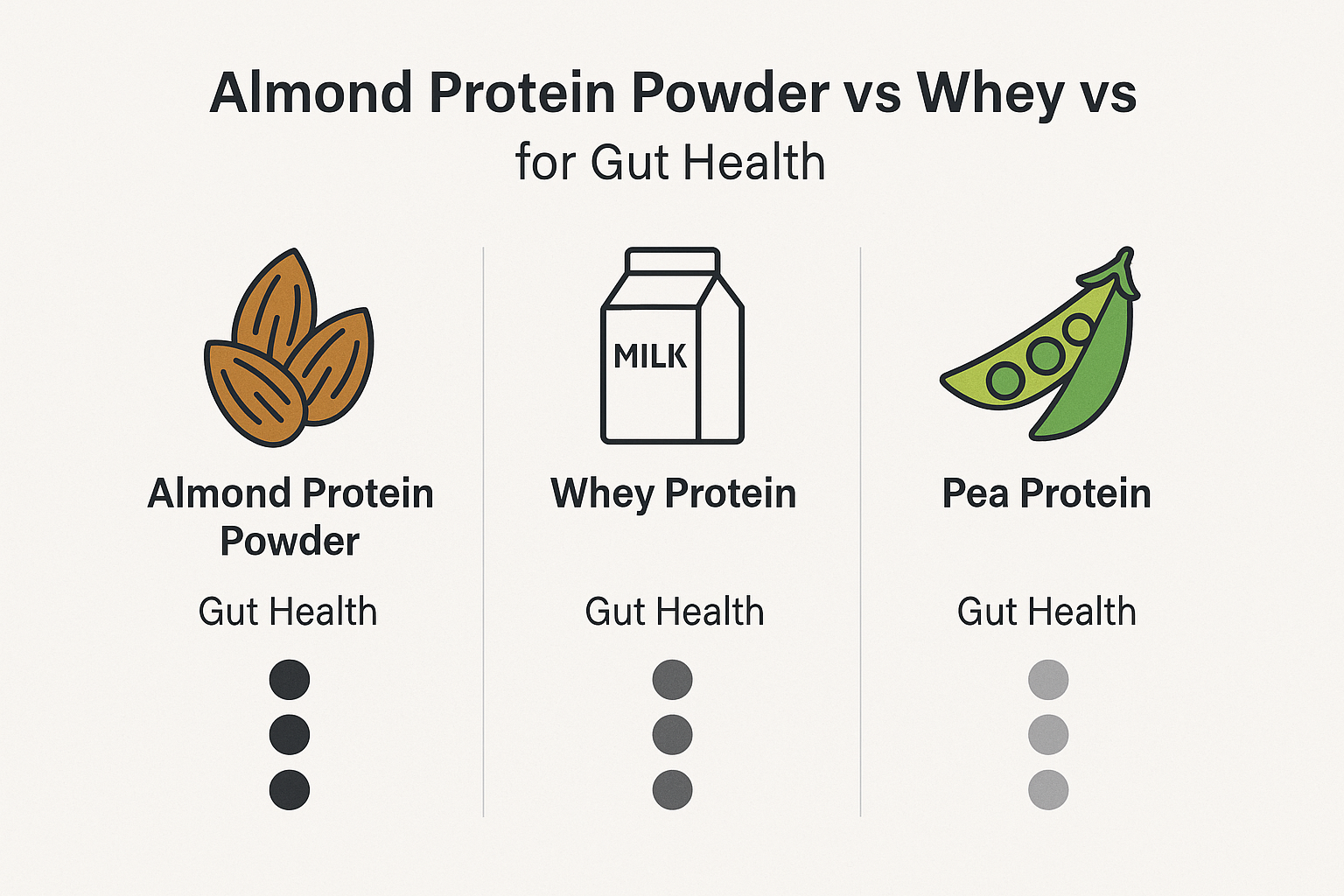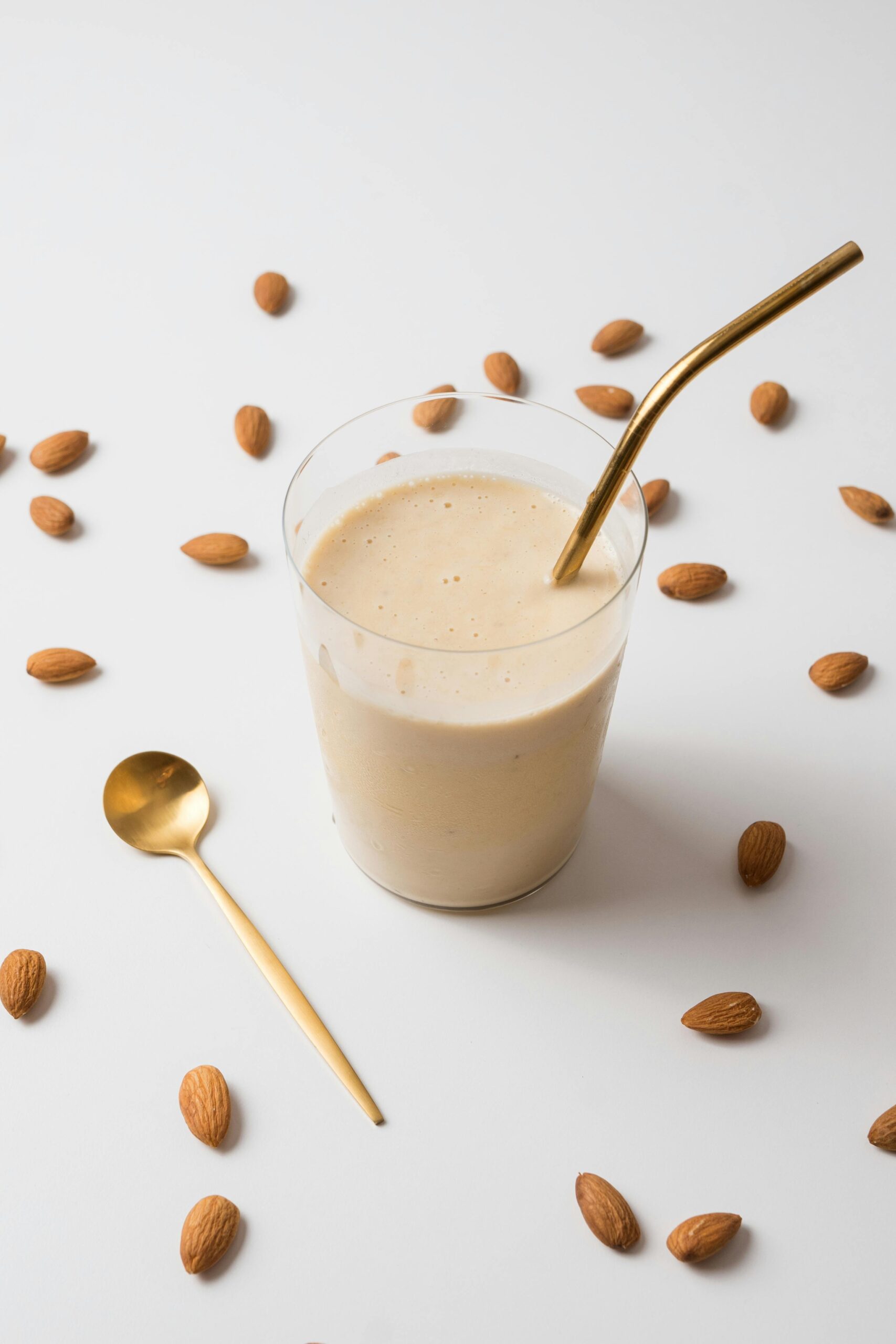Almond protein powder for gut health is quickly becoming the go-to alternative for those who struggle with whey or soy proteins. Unlike typical dairy-based powders, almond protein (especially defatted and minimally processed) is naturally easy to digest and gut-friendly.
In this guide, you’ll discover:
FAQs on bioavailability, women-specific needs, and low-FODMAP diets
How much protein is in 1 almond and per 100g
Why defatted almond protein is superior for digestion
How to choose the best gut-friendly protein powder in India
The exact label red flags (gums, artificial sweeteners, fillers) you must avoid
1) What is Almond Protein (and Why India Needs It Now)
Almond protein powder for gut health is derived from blanched or defatted almonds, making it a lighter and more digestible plant protein source. For many Indians who experience bloating, reflux, or discomfort with whey protein, almond protein is a cleaner, vegan, and gut-friendly solution.

Almond protein powder for gut health – vegan and gut-friendly protein alternative in India
2) Protein in Almonds: Per Almond, Per 100g, and in Almond Protein Powder
Each almond has about 0.25–0.3 g of protein, while 100 g of almonds provide around 20–22 g of protein. When processed into almond protein powder, the protein content can jump to 50–65% due to the removal of fat and fiber.
Almond Protein Powder for Gut Health vs Whey vs Pea: Which is Better?
When compared to whey and pea protein, almond protein powder for gut health often performs better because it is free from lactose, low in anti-nutrients, and doesn’t require artificial thickeners or emulsifiers.
| Attribute | Almond Protein | Whey Protein | Pea Protein |
|---|---|---|---|
| Digestive Comfort | High (esp. defatted, clean-label) | Varies; lactose & additives can bloat | Moderate (some feel gassy) |
| FODMAP Friendly | Usually good | Depends on formulation | Usually okay |
| Allergen Risk | Tree-nut allergy risk | Dairy intolerance common | Legume intolerance in some |
| Flavor & Texture | Mild, smooth | Creamy | Earthy, chalky |
| Women Gut Health Focus | Excellent (clean, low irritants) | Often problematic (sweeteners, concentrates) | Decent with clean labels |
4) Defatted Almond Protein: The Silent Hero for Digestion
“Defatted” means a large portion of the almond’s fat is removed, resulting in:
- Higher protein % per scoop
- Lower calories
- Better mixability and less heaviness after drinking
- For many, less bloating vs whole-almond powders
When shopping, look for “defatted almond protein” on the ingredient list—not just “almond powder”.

Almond protein powder for gut health – vegan and gut-friendly protein alternative in India
5) How Protein Interacts with Your Gut Microbiome
Protein doesn’t act alone—your gut bacteria ferment leftovers. The wrong formula (loaded with sugar alcohols, gums, emulsifiers, artificial sweeteners) can:
- Trigger gas, cramping, and loose stools
- Shift your microbiome towards pro-inflammatory profiles
- Increase intestinal permeability (“leaky gut”) symptoms in sensitive people
Clean almond protein with minimal ingredients, no artificial sweeteners, and no gums is far less likely to disturb the microbiome.
6) The Wholesomecore Checklist: How to Pick a Gut-Friendly Protein Powder in India
Buy if it has:
- ✅ Defatted almond protein as the first ingredient
- ✅ Short ingredient list (ideally <5)
- ✅ No artificial sweeteners (acesulfame K, sucralose, aspartame)
- ✅ No sugar alcohols (erythritol, maltitol, sorbitol) if you’re sensitive
- ✅ No gums/emulsifiers (carrageenan, xanthan gum, guar gum) — or minimal
- ✅ Lab-tested heavy metals & microbiology (brand transparency)
Avoid if it has:
- ❌ Proprietary blends hiding exact protein source or %
- ❌ “Natural flavors” with no disclosure (can hide irritants)
- ❌ Long lists of fillers, flow agents, and colors
7) How to Use Almond Protein Daily (Women-Focused Tips): How Almond Protein Powder Supports Women’s Gut Health
Smoothie for gut health: almond protein + banana (or low-FODMAP fruit if needed) + lactose-free curd or coconut yogurt + cinnamon + chia
Warm almond protein latte: Mix with warm (not boiling) almond milk + a touch of jaggery powder if needed
Protein oats: Stir into cooked oats (let it cool slightly before adding) to avoid clumping
Baked snacks: Use defatted almond protein to make high-protein pancakes, rotis, or cookies without the whey taste
Top 5 Benefits of Almond Protein Powder for Gut Health
Easier Digestion: Almond protein powder is naturally lactose-free and gentle on sensitive stomachs.
Supports Gut Microbiome: The clean formulation avoids artificial sweeteners that can harm gut bacteria.
Low in FODMAPs: Perfect for people with IBS or bloating issues.
Rich in Prebiotic Fiber: Helps feed the good bacteria in your gut.
Best Plant-Based Alternative: Compared to whey and soy, almond protein is less inflammatory and cleaner.
8) Side Effects & Who Should Be Careful
Tree nut allergies: almond protein isn’t for you
Severe IBS/SIBO: start with ½ serving and monitor symptoms
Histamine intolerance: ensure no fermented flavors/additives
Pregnant or breastfeeding: choose clean-label brands and talk to your doctor
If you want a clean, vegan-friendly option, almond protein powder for gut health can be your daily go-to
Articles on
protein and health benefits of almonds
role of protein in gut microbiome
Best Almond Protein Powder for Gut Health in India
Q1. How much protein is in 1 almond?
~0.25–0.3 g per almond, depending on size and variety.
Q2. Is almond protein powder complete?
It can be low in certain amino acids (e.g., lysine) compared to whey or pea. You can blend almond + pea for a more balanced amino acid profile.
Q3. Is almond protein good for women with PCOS or IBS?
Yes—if the label is clean and low in sweeteners/gums, it’s typically easier on digestion and won’t spike insulin like sugar-heavy blends.
Q4. Is almond protein low-FODMAP?
Usually yes, but it depends on the formulation—watch for inulin, chicory root, sugar alcohols.
Q5. How much protein per 100g of almonds?
Roughly 20–22 g. Almond protein powder concentrates this to 50–65%+.
Q6. Is almond protein powder good for gut health?
Yes, especially defatted almond protein, as it is lactose-free, low-FODMAP, and free from harsh additives.
Q7. Is almond protein better than whey?
For sensitive stomachs, almond protein powder for gut health is often better due to fewer digestive triggers.




Leave a Reply